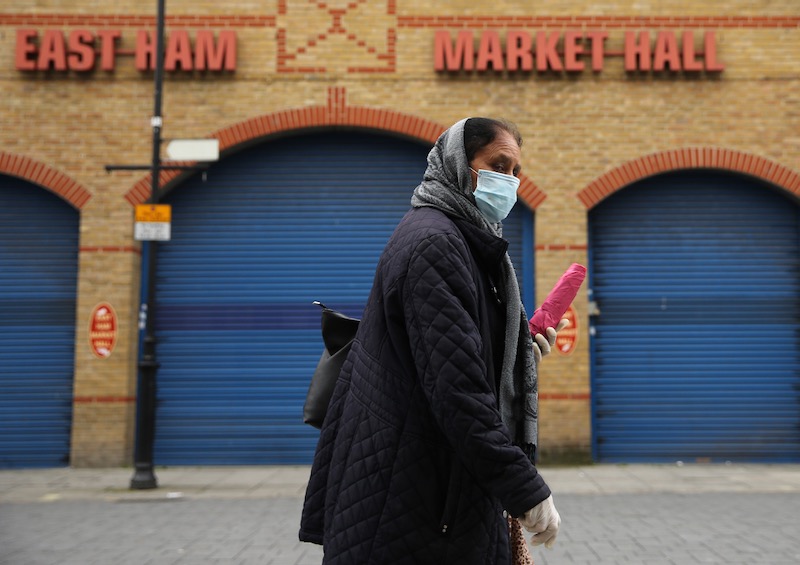The evidence seems compelling that some sections of the population are more at risk from coronavirus than others. So should the post-lockdown unwinding process discriminate? There have been significantly more deaths among males than females, significantly more among the elderly, significantly more from those already suffering from some other form of ill health, and significantly more among those with a poor standard of living. The age factor, in particular, has led to the suggestion that relaxation of the lockdown should be confined to those under 70.
Now figures from the Office of National Statistics confirm that there is far higher risk from coronavirus in the black community and from those of Asian origin, and this does not appear to correlate entirely with those other categories. This effect first became apparent, for instance, when it was found 10 out of 11 of the early deaths were doctors from Asian backgrounds. (Asian in a UK context means from the Indian Subcontinent.) They are unlikely to have been poor or ill-housed.
If it was logical to discriminate against the over 70s, for their sake as much as for the rest of the community, it would be equally logical to discriminate against people with black or brown skins, for that is what these statistics imply. In fact skin colour may not be totally irrelevant, as Vitamin D is more easily absorbed from sunlight by people with white skin, and Vitamin D boosts the immune system. But it is not hard to image the outcry if Government measures appeared to penalise people on the basis of race. Spot fines for elderly Black people seen out of doors? It is just not tenable; and this may therefore also kill off the idea of legal discrimination on the basis of sex or age.
Nevertheless there is something here to explore. Should healthy middle class young white women, to take one of the least at-risk categories, be made to stay indoors perhaps even losing their livelihoods, because of a universal rule designed to protect high risk groups like frail working class elderly black men? Logically, they should not. It is disproportionate.
Such discrimination couldn't be compulsory. On a voluntary basis, however, backed by an official advertising campaign, it might work. The analogy, valid only in this narrow sense, would be with the massive safe-sex warning campaign during the HIV/Aids epidemic. It was not imposed on people by law, but it certainly put the fear of God into them. It increased intolerance against homosexual people, but it also saved lives. To use another example, everyone knows that frail elderly people should wrap up well if they go out in the cold, for the sake of their health. But no law says they must.
The higher rate of deaths from Covid-19 among the elderly may be in part a function of the higher rate of deaths in care homes, where many such people live. Those communities are extremely susceptible to a highly contagious disease. The higher rate among people with dark skin may also partly be because that is where many of them work. One of the facts to emerge since public attention was first drawn to the crisis in the care home sector was the lack of eligibility for sick pay, or in some cases a meagre amount of it, not enough to live on, for many who work in them.
There is a scandal within a scandal here. Under Margaret Thatcher's privatisation measures, local authorities were obliged to withdraw from the provision of care homes, to sell off those they had and yet to continue to fund those elderly people who could not afford the fees according to a strict means test. Meanwhile, under David Cameron's austerity programme, local authority funding by central government was slashed almost to nothing.
Local councils still had to pay social care fees out of their general income. They deliberately set the rates low, taking advantage of the widespread practice in the care-home sector of cross-subsidising local authority-supported residents with funding from those who paid their own fees. The result is that most care homes are run on very tight margins. Wages are kept low, usually the minimum the law allows, while some staff are on zero-hours contracts so there is no guaranteed level of work or income. The are only minimally trained, and classed as unskilled.
With no sick pay available, staff who start to feel ill and may be infectious possibly from Covid-19, are nevertheless obliged to keep going to work. They can't afford not to. They may have caught the disease from residents, or may be a source of infection themselves, or more likely, both. And the supply of safety equipment to care homes, despite all the Government's many fine promises, has lagged far behind demand.
Addressing this scandalous situation may partly reduce the proportion of black and minority ethnic workers among the victims of Covid-19, but it is unlikely to eliminate the disparity entirely. So they, and every other group found to be more vulnerable than average, need advice on how to keep themselves safe and enough income to take advantage of it. What they don't need is to be stopped in the street by the police and asked to produce a birth certificate.



 Loading ...
Loading ...
What do you think?
You can post as a subscriber user ...
User comments (0)